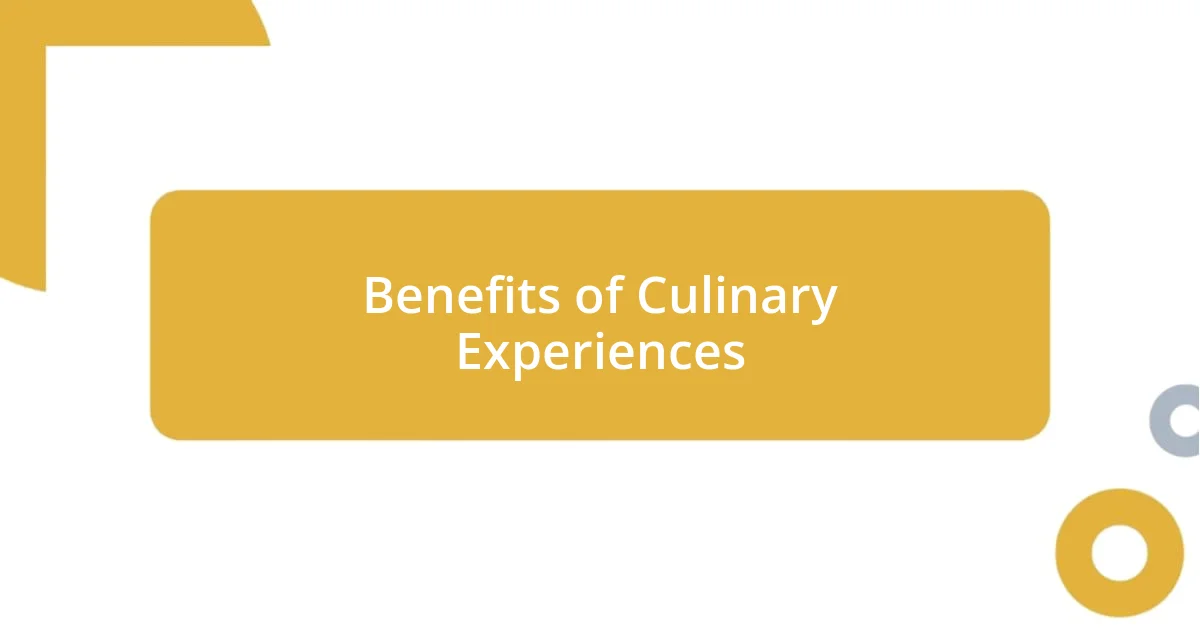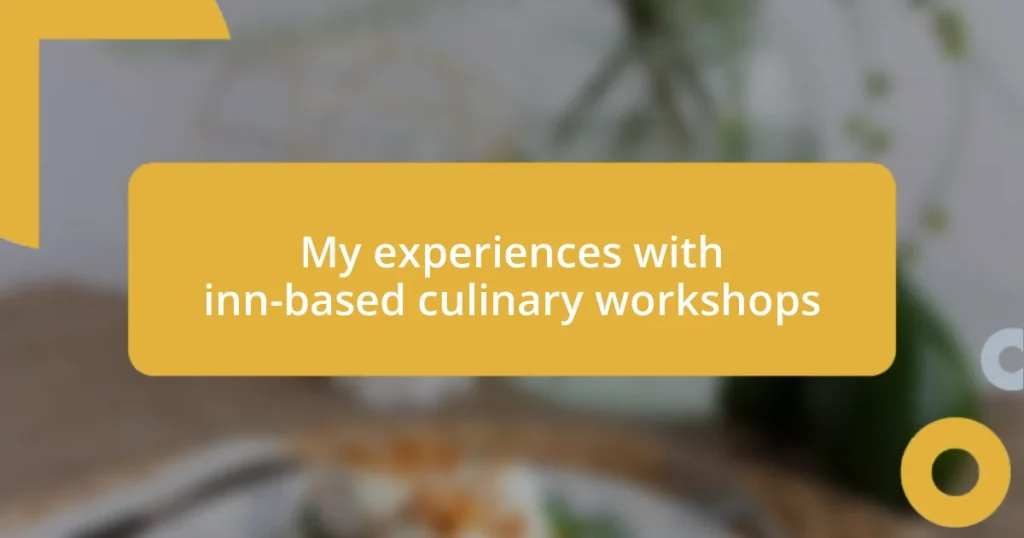Key takeaways:
- Inn-based culinary workshops create an intimate learning environment, emphasizing local ingredients and traditional techniques, which enhances both culinary skills and appreciation for food heritage.
- Choosing the right inn is crucial for an enjoyable experience; factors like location, reputation, amenities, and host engagement significantly impact the quality of the workshop.
- Culinary experiences not only develop cooking skills but also foster community, encourage creativity with food, and create lasting memories through shared stories and collaborative activities.

Overview of Inn-Based Workshops
Inn-based culinary workshops offer a unique blend of learning and leisure, often set in picturesque surroundings that enhance the overall experience. I remember arriving at an inn nestled in the mountains, the cozy atmosphere instantly made me feel at home. Have you ever experienced that feeling where the environment itself elevates your mood and ignites your creativity?
These workshops usually bring together a small group of participants, fostering an intimate and collaborative learning environment. I recall working side by side with fellow food enthusiasts, sharing tips and laughter as we chopped, sautéed, and plated our creations. It truly felt like a culinary family gathering where everyone’s passion for food was the star of the show.
Additionally, most inn-based workshops focus on local ingredients and traditional cooking techniques, allowing participants to connect with the region’s culinary heritage. I’ve found that learning about the origins of specific dishes while preparing them deepens the appreciation for the food itself. Doesn’t it make you ponder how much more meaningful a meal becomes when you understand its roots?

Choosing the Right Inn
Choosing the right inn for a culinary workshop can significantly enhance your experience. I remember feeling a sense of relief when I discovered an inn with enthusiastic hosts who genuinely cared about the culinary journey of their guests. Having the right atmosphere makes all the difference—it’s not just about the food, but also the warmth and hospitality that surround you.
Here are some key factors to consider when selecting an inn for your culinary workshop:
- Location: Look for an inn that’s tucked away in beautiful surroundings, which can add to the comfort and charm of the experience.
- Reputation: Read reviews or ask for recommendations to find out if past participants enjoyed their experience.
- Amenities: Ensure the inn has the facilities you need, like a spacious kitchen and cozy accommodations for relaxation after a day of cooking.
- Focus on Local Cuisine: Choose an inn that emphasizes local ingredients and regional cooking styles, as this can enrich your culinary learning.
- Host Engagement: I always appreciate when the innkeepers are deeply involved in the workshops, sharing their culinary passion and local knowledge.
Finding the right inn ensures that your culinary adventure not only teaches you skills but also creates lasting memories.

Types of Culinary Workshops Offered
The types of culinary workshops offered at inns can vary widely, catering to different interests and skill levels. Some workshops focus on specific cuisines, like Italian or Thai, where you can dive deep into unique cooking methods and signature dishes. I clearly remember jumping into a pasta-making workshop, my hands dusted with flour, as I learned to create fresh ravioli from scratch. It was fascinating to see how a simple ingredient could transform into something so exquisite. Have you ever tried your hand at making fresh pasta? The satisfaction of enjoying something you created is simply unparalleled.
On the other hand, there are workshops dedicated to specific techniques like baking or farm-to-table cooking. During a baking workshop, I discovered the intricacies of sourdough bread, from starter creation to the perfect rise. The aroma of freshly baked bread enveloping the kitchen was so inviting—it felt like home. Participating in these focused experiences not only improves your skills but also connects you with the history and artistry of food preparation. Don’t you love how a single workshop can teach you not just to cook, but to appreciate the craftsmanship behind each dish?
Lastly, some inns offer unique themed workshops, such as seasonal cooking or even pairing food with wine. I once took part in a workshop that focused on autumn harvest dishes, where I learned to incorporate pumpkins, squash, and spices into comforting recipes. The experience felt like a celebration of the changing season, allowing me to immerse myself in the flavors of fall. Each type of workshop, whether it’s focused on technique, cuisine, or a theme, brings its own flavor to the culinary experience, inviting participants to explore and create in new and exciting ways.
| Workshop Type | Description |
|---|---|
| Cuisine-Specific | Focus on particular cuisines like Italian or Thai, offering deep dives into their cooking methods. |
| Technique-Based | Emphasis on specific cooking skills such as baking, fermentation, or knife skills. |
| Themed Workshops | Workshops centered on seasonal ingredients or unique pairings like food and wine. |

Unique Ingredients and Local Flavors
When it comes to unique ingredients, one of my fondest memories is wandering through a local farmer’s market right before a workshop, surrounded by vibrant colors and enticing aromas. I couldn’t help but smile as I picked up a basket of heirloom tomatoes, their irregular shapes and deep hues promising rich flavors. This experience reminded me that the best culinary creations often stem from the most unexpected ingredients that tell a story of their origin. Have you ever experienced the thrill of discovering something new at a market? I find it transforms the way you view cooking, as if the produce speaks to your creative instincts.
Participating in a workshop that emphasized local flavors was a game-changer for me. As we cooked together, the instructor shared tales about each ingredient’s significance to the community. For instance, we used wild herbs that only flourish in that specific region, giving the dish a taste that simply couldn’t be replicated elsewhere. I remember infusing my pasta with fresh basil and foraged garlic mustard. It felt exhilarating to connect with the land and its bounty—those flavors had an authenticity that made my heart race. Isn’t it fascinating how local ingredients can spark memories and emotions that transcend the plate?
Another standout moment was when we experimented with a spice unique to the region—Sumac, with its tangy, citrusy kick. I had never encountered it before, but incorporating it into our dishes added a depth that was unexpected and delightful. It opened my eyes to the idea that cooking is as much about the ingredients as it is about tradition and innovation. Don’t you think it’s amazing how a single ingredient can elevate an entire meal, creating a lasting impression on your palate? This journey through unique ingredients and local flavors not only taught me new techniques but also fostered a deeper appreciation for the culinary gems that our surroundings offer.

Hands-On Cooking Techniques
Getting hands-on in the kitchen can really elevate your culinary experience, and I’ve found that learning specific cooking techniques is the heart of any workshop. I recall a moment during a knife skills session where I was taught the proper way to hold a chef’s knife. It felt almost meditative as I sliced through vegetables, each precise cut reminding me that mastery comes from practice. Have you ever noticed how the right technique transforms not just the efficiency of cooking but also the joy of it? It’s like discovering a hidden layer to flavor itself.
During a recent workshop, I took on the art of sautéing, a technique that, at first glance, seemed simple. Yet, as the instructor expertly guided us to control the heat and understand the importance of timing, I realized how vital it is to develop a feel for the ingredients. The way the aroma of garlic and onions filled the kitchen was intoxicating! Experiencing that moment taught me that a technique isn’t just about method; it’s about connecting with what you’re cooking and making it sing. Have you ever felt that spark when flavors come together?
Perhaps my favorite memory was the day we delved into the world of emulsification during a salad dressing class. I remember standing at the mixing bowl, whisking vigorously to combine oil and vinegar. The miracle of transformation—watching those once-separate ingredients blend into a creamy, vibrant dressing—was absolutely exhilarating. Technique enhances creativity; it allows you to experiment, knowing you have the foundation to support your culinary adventures. Isn’t it interesting how a little practice can turn a daunting task into a delightful experience?

Benefits of Culinary Experiences
Exploring culinary experiences has been a revelation for me, as they offer a unique combination of learning, connection, and joy. I remember my first workshop: the scents of spices filled the air, and I felt an instant spark of excitement. Each dish we created became a shared story, weaving together the participants’ memories and cultures. Isn’t it wonderful how food has the power to unite people, even strangers, over a shared love of flavors and techniques?
The benefit of immersing yourself in cooking is that it deepens your relationship with food. In one session, we plated a dish using leftover ingredients from our previous meals, and I felt a rush of creativity as I transformed what could have been waste into a gourmet experience. This lesson in resourcefulness changed the way I looked at my pantry—do you ever find yourself tossing out food instead of getting creative? Culinary experiences encourage you to think outside the box and embrace new approaches to cooking.
Additionally, I’ve discovered that culinary workshops often foster a supportive community. During a particularly fun event, we teamed up in small groups and faced a timed challenge. The camaraderie, laughter, and even friendly competition made the atmosphere electric. It reminded me that learning doesn’t have to be isolating; instead, it can be a bonding experience, enriching not just your culinary skills but your social life as well. Have you ever felt that magic when working alongside others, turning a task into a joyful collaboration? Those shared experiences bring added value, making each workshop far more than just an opportunity to cook.















